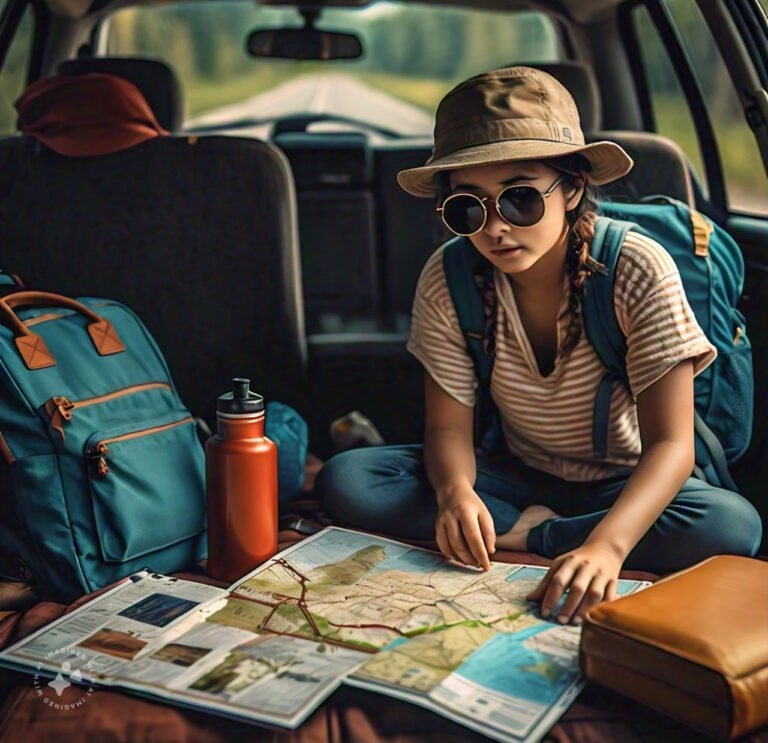Embarking on a Solo Road Trip: A Safe and Enjoyable Journey
Solo road trips are the epitome of freedom and self-discovery. They offer the thrill of adventure and the joy of exploring new places on your own terms. Whether you’re setting out to clear your mind, seek solitude, or simply enjoy the open road, a solo road trip gives you complete control over your journey. But to ensure your adventure is both safe and enjoyable, preparation is key. In this guide, we’ll cover the essential tips to help you have a smooth and memorable solo road trip experience.
1. Planning and Preparation: 
The foundation of a successful solo road trip is thorough planning. Before you hit the road, create a detailed plan of your journey. Consider your destination, the route, the duration of your trip, and the weather conditions you might encounter. Each of these factors will influence what you need to pack, where you should stop, and how you pace yourself.
Start by selecting your route. You can choose scenic routes for a more relaxed, picturesque drive or stick to highways if you’re focused on reaching your destination quickly. Keep in mind that a flexible itinerary allows for spontaneous detours, which often lead to some of the most enjoyable discoveries.
Accommodation is another crucial aspect of planning. Whether you prefer hotels, motels, or campgrounds, research and book ahead to avoid last-minute scrambling. Secure a place to rest after long hours of driving—it can make all the difference in your journey.
2. Vehicle Maintenance:
Your vehicle is the heart of your road trip, especially when traveling solo. Before setting out, give your car a thorough check-up. This includes testing the engine, inspecting the brakes, checking tire pressure, and making sure all fluids—oil, coolant, brake fluid, and windshield washer fluid—are at optimal levels.
Car trouble can quickly turn an enjoyable journey into a stressful situation, especially when you’re alone. To avoid this, consider getting a professional tune-up if you haven’t had one in a while. Also, ensure you have a roadside assistance plan in place. Services like AAA or manufacturer-provided plans can be a lifesaver if you encounter unexpected issues.
3. Emergency Kit:
A well-stocked emergency kit is non-negotiable for a solo road trip. In case of an unforeseen event, such as a flat tire or a medical emergency, having the right tools on hand can make all the difference. Essential items for your kit should include:
- A first aid kit
- Spare batteries
- A flashlight
- Jumper cables
- A tire repair kit
- Basic tools like a screwdriver, wrench, and pliers
- A physical map (in case you lose GPS signal)
These items are critical for ensuring your safety in emergencies and preventing small issues from escalating into major problems.
4. Safety Measures:
Solo travelers need to be extra cautious about safety. Always keep your car doors locked, both while driving and during stops. When parking, choose well-lit and populated areas, especially if you’re stopping overnight. Avoid leaving valuables in sight, as this can attract unwanted attention.
Additionally, if you’re venturing into remote areas, let someone know your itinerary and check in regularly. Sharing your location with a trusted friend or family member can provide peace of mind for both you and your loved ones.
5. Health and Comfort: 
Long hours on the road can take a toll on your body. To make your solo road trip enjoyable, prioritize your health and comfort. Bring along a comfortable seat cushion and a neck pillow to help prevent fatigue and discomfort. Regular breaks are essential—stop every two hours to stretch, walk around, and get some fresh air.
Staying hydrated is just as important as staying comfortable. Keep a water bottle within reach, and avoid excessive consumption of caffeine or sugary drinks, which can lead to energy crashes later. Packing healthy, energy-boosting snacks, such as nuts, fruits, and granola bars, can keep you fueled throughout the journey.
6. Understanding Local Laws and Regulations
As you travel across different regions, remember that traffic laws, road signs, and speed limits may vary. Pay attention to these differences to avoid unnecessary fines or dangerous situations. Familiarize yourself with local regulations, especially if you plan to drive through different states or countries.
Some areas may have specific driving requirements, such as toll roads or certain types of vehicle permits. Checking these details in advance will help you avoid confusion on the road.
7. Budgeting:
Creating a budget for your solo road trip is vital to ensure financial peace of mind. While you can estimate costs for fuel, accommodation, and food, it’s a good idea to keep your budget flexible to account for unexpected expenses.
For example, road trips often lead to unexpected discoveries—like a must-visit restaurant or a unique local experience—that you may want to splurge on. Keeping some extra funds aside for these delightful surprises can enhance your journey without stressing your wallet.
8. Entertainment and Relaxation:
One of the joys of solo road trips is the chance to spend time with your thoughts and enjoy your own company. However, long hours on the road can become monotonous without entertainment. To keep the journey enjoyable, curate a playlist of your favorite music, or download podcasts and audiobooks that you’ve been meaning to listen to.
In addition to entertainment, relaxation is important. Breathing exercises, meditation, or even stopping at scenic viewpoints to take in the beauty around you can refresh your mind and body.
9. Solo Travel Precautions: 
Solo travel offers freedom, but it also requires you to take extra precautions for your safety. Keep your phone charged at all times and carry a power bank for backup. Store emergency contacts, important documents (such as your ID and insurance information), and local emergency service numbers within easy reach.
When exploring new places, trust your instincts. If a situation doesn’t feel right, it’s okay to leave. Always be aware of your surroundings, especially when stopping in unfamiliar areas.
10. Weather Conditions:
Weather can greatly affect your road trip experience, so it’s essential to check the forecast before and during your trip. Pack appropriately for the conditions—whether it’s rain gear, warm layers, or sunscreen and hats for hot weather.
If you encounter extreme weather while driving, such as heavy rain or snow, it’s important to adjust your speed and driving style accordingly. In severe conditions, consider waiting it out rather than risking your safety on dangerous roads.
11. Staying Connected:
Even though solo road trips offer solitude, staying connected with family and friends is essential for safety. Regularly check in with someone you trust to let them know where you are and your plans for the day.
Additionally, ensure your phone is always charged and consider carrying a car charger to prevent running out of battery during critical moments.
12. Accommodation: Plan Ahead for Peace of Mind
Whether you prefer staying at hotels, motels, or campgrounds, planning your accommodation ahead of time can save you from the stress of last-minute bookings. Look for places with good reviews and ratings, especially if you’re stopping in a new area.
Confirm your bookings ahead of time and make a note of check-in and check-out times. Knowing where you’ll be resting each night allows you to relax and focus on enjoying your journey.
13. Respecting Local Culture and Customs
As you travel through different areas, be mindful of the local culture. Understanding and respecting local customs can enhance your trip and leave you with positive interactions. Whether it’s a small town with unique traditions or a region with a different language, showing respect for the people and places you visit makes your journey more fulfilling.
14. Documenting Your Journey:
A solo road trip offers countless memorable moments, and documenting these experiences can help you cherish them for years to come. Whether through photographs, videos, or a travel journal, taking the time to reflect on your journey allows you to relive those moments.
15. Post-Trip Review:
After your trip, take time to reflect on the experience. What went well? What challenges did you face? Did your packing list work out? Reviewing your trip helps you learn and improve for future road trips, ensuring that your next solo adventure is even better.
Conclusion
Solo road trips are a fantastic way to experience the freedom of the open road and explore the world at your own pace. By following these tips, you can ensure your journey is both safe and enjoyable, allowing you to focus on the adventure ahead. So, prepare your vehicle, plan your route, and set off on a journey filled with discovery, relaxation, and unforgettable experiences.





